
Franco-Persian alliance
Encyclopedia
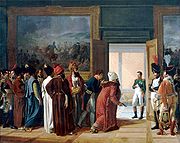
First French Empire
The First French Empire , also known as the Greater French Empire or Napoleonic Empire, was the empire of Napoleon I of France...
of Napoleon I
Napoleon I
Napoleon Bonaparte was a French military and political leader during the latter stages of the French Revolution.As Napoleon I, he was Emperor of the French from 1804 to 1815...
and the Persian Empire
Qajar dynasty
The Qajar dynasty was an Iranian royal family of Turkic descent who ruled Persia from 1785 to 1925....
of Fath Ali Shah against Russia
Russia
Russia or , officially known as both Russia and the Russian Federation , is a country in northern Eurasia. It is a federal semi-presidential republic, comprising 83 federal subjects...
and Great Britain
Great Britain
Great Britain or Britain is an island situated to the northwest of Continental Europe. It is the ninth largest island in the world, and the largest European island, as well as the largest of the British Isles...
between 1807 to 1809. The alliance was part of a grand Napoleonic scheme to cross the Middle East
Middle East
The Middle East is a region that encompasses Western Asia and Northern Africa. It is often used as a synonym for Near East, in opposition to Far East...
in order to attack British India. The alliance unravelled when France finally allied with Russia and turned its focus to European campaigns.
Background
Due to the traditional friendly relations of France with the Ottoman EmpireOttoman Empire
The Ottoman EmpireIt was usually referred to as the "Ottoman Empire", the "Turkish Empire", the "Ottoman Caliphate" or more commonly "Turkey" by its contemporaries...
(a traditional enemy of the Persian Empire) formalized by a long-standing Franco-Ottoman alliance
Franco-Ottoman alliance
The Franco-Ottoman alliance, also Franco-Turkish alliance, was an alliance established in 1536 between the king of France Francis I and the Turkish ruler of the Ottoman Empire Suleiman the Magnificent. The alliance has been called "the first non-ideological diplomatic alliance of its kind between a...
, the relations of France with the Persian Empire had long been very minimal. Instead, a Habsburg-Persian alliance
Habsburg-Persian alliance
A Habsburg-Persian alliance was attempted and to a certain extent achieved in the 16th century between the Habsburg Empire and the Persian Empire in their common conflict against the Ottoman Empire.-First contacts:...
had developed during the 16th century, and when Persian embassies visited Europe with the Persian embassy to Europe (1599–1602)
Persian embassy to Europe (1599–1602)
The Persian embassy to Europe was dispatched by the Persian Shah Abbas I in 1599 to obtain an alliance against the Ottoman Empire. The Persians had then been at war with the Ottoman Empire for more than a century, and so decided to try to obtain European help against the Ottomans...
and the Persian embassy to Europe (1609–1615)
Persian embassy to Europe (1609–1615)
The Persian embassy to Europe was dispatched by the Persian Shah Abbas I in 1609 to obtain an alliance with Europe against the Ottoman Empire. The embassy was led by the Englishman Robert Shirley.-Background:...
, they pointedly avoided France.
First rapprochement
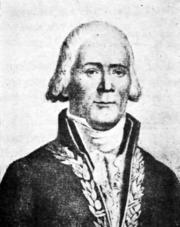
Persian embassy to Louis XIV
The Persian embassy to Louis XIV caused a dramatic flurry at the court of Louis XIV in 1715, the year of the Sun King's death. Mohammed Reza Beg, or in French sources Méhémet Riza Beg, was a high-ranking official to the Persian governor of the Yerevan province...
, but these relations ceased in 1722 with the fall of the Safavid dynasty
Safavid dynasty
The Safavid dynasty was one of the most significant ruling dynasties of Iran. They ruled one of the greatest Persian empires since the Muslim conquest of Persia and established the Twelver school of Shi'a Islam as the official religion of their empire, marking one of the most important turning...
and the invasion of Persia by the Afghans
Afghanistan
Afghanistan , officially the Islamic Republic of Afghanistan, is a landlocked country located in the centre of Asia, forming South Asia, Central Asia and the Middle East. With a population of about 29 million, it has an area of , making it the 42nd most populous and 41st largest nation in the world...
.
Attempts to resume contact were made following the French revolution
French Revolution
The French Revolution , sometimes distinguished as the 'Great French Revolution' , was a period of radical social and political upheaval in France and Europe. The absolute monarchy that had ruled France for centuries collapsed in three years...
, as France was in conflict with Russia
Russia
Russia or , officially known as both Russia and the Russian Federation , is a country in northern Eurasia. It is a federal semi-presidential republic, comprising 83 federal subjects...
and wished to find an ally against that country. In 1796, two scientists, Jean-Guillaume Bruguières and Guillaume-Antoine Olivier
Guillaume-Antoine Olivier
Guillaume-Antoine Olivier was a French entomologist.He was the author of Entomologie, ou histoire naturelle des Insectes and Le Voyage dans l'Empire Othoman, l'Égypte et la Perse . He was a close friend of Johan Christian Fabricius and a patron of Pierre André Latreille.-References:...
, were sent to Persia by the Directoire, but were unsuccessful in obtaining an agreement.
Soon however, with the advent of Napoleon I
Napoleon I
Napoleon Bonaparte was a French military and political leader during the latter stages of the French Revolution.As Napoleon I, he was Emperor of the French from 1804 to 1815...
, France adopted a strongly expansionist policy in the Mediterranean and the Near East
Near East
The Near East is a geographical term that covers different countries for geographers, archeologists, and historians, on the one hand, and for political scientists, economists, and journalists, on the other...
. Following the Treaty of Campo Formio
Treaty of Campo Formio
The Treaty of Campo Formio was signed on 18 October 1797 by Napoleon Bonaparte and Count Philipp von Cobenzl as representatives of revolutionary France and the Austrian monarchy...
in 1797, France acquired possessions in the Mediterranean such as the Ionian islands
Ionian Islands
The Ionian Islands are a group of islands in Greece. They are traditionally called the Heptanese, i.e...
as well as former Venetian bases on the coast of Albania
Albania
Albania , officially known as the Republic of Albania , is a country in Southeastern Europe, in the Balkans region. It is bordered by Montenegro to the northwest, Kosovo to the northeast, the Republic of Macedonia to the east and Greece to the south and southeast. It has a coast on the Adriatic Sea...
and Greece
Greece
Greece , officially the Hellenic Republic , and historically Hellas or the Republic of Greece in English, is a country in southeastern Europe....
, geographically close to the Middle-East.
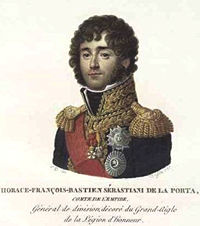
Ottoman Empire
The Ottoman EmpireIt was usually referred to as the "Ottoman Empire", the "Turkish Empire", the "Ottoman Caliphate" or more commonly "Turkey" by its contemporaries...
to establish a French presence in the Middle East, with the ultimate dream of linking with a Muslim enemy of the British in India, Tippu Sahib. Napoleon assured the Directoire that "as soon as he had conquered Egypt, he will establish relations with the Indian princes and, together with them, attack the English in their possessions." According to a 13 February 1798 report by Talleyrand: "Having occupied and fortified Egypt, we shall send a force of 15,000 men from Suez
Suez
Suez is a seaport city in north-eastern Egypt, located on the north coast of the Gulf of Suez , near the southern terminus of the Suez Canal, having the same boundaries as Suez governorate. It has three harbors, Adabya, Ain Sokhna and Port Tawfiq, and extensive port facilities...
to India, to join the forces of Tipu-Sahib and drive away the English."
Napoleon was initially defeated by the Ottoman Empire and Britain at the Siege of Acre
Siege of Acre (1799)
The Siege of Acre of 1799 was an unsuccessful French siege of the Ottoman-defended, walled city of Acre and was the turning point of Napoleon's invasion of Egypt and Syria.-Background:...
in 1799, and at the Battle of Abukir
Battle of Abukir (1801)
The Battle of Abukir of 8 March 1801 was the second battle of the Egyptian campaign in the French Revolutionary Wars, to be fought at Abu Qir on the Mediterranean coast, near the Nile delta. A British army of 5,000 led by General Ralph Abercromby landed along the beach to dislodge an entrenched...
in 1801; by 1802, the French were completely vanquished in the Middle East.
In order to reinforce the Western border of British India, the diplomat John Malcolm
John Malcolm
Major-general Sir John Malcolm was a Scottish soldier, statesman, and historian-Early life:Born at Burnfoot, Dumfriesshire, Malcolm was the son of George Malcolm, a gentleman farmer of Eskdale and Burnfoot. Jock, as he was then known, was one of the four Malcolm brothers who attained knighthoods...
was sent to Persia to sign the Anglo-Persian Treaty of 1801
Anglo-Persian Treaty of 1801
The Anglo-Persian Treaty of 1801 was signed between the English diplomat John Malcolm and the Shah of Persia Fath Ali Shah in 1801. The Treaty was proposed at the initiative of Great Britain in order to reinforce the Western border of British India, following the threat of French invasion during...
. The Treaty offered English support against Russia and trade advantages, and explicitly provided against French intervention in Persia:
Soon however, from 1803, Napoleon went to great lengths to try to convince the Ottoman Empire to fight against Russia
Russia
Russia or , officially known as both Russia and the Russian Federation , is a country in northern Eurasia. It is a federal semi-presidential republic, comprising 83 federal subjects...
in the Balkans
Balkans
The Balkans is a geopolitical and cultural region of southeastern Europe...
and join his anti-Russian coalition. Napoleon sent General Horace Sebastiani as envoy extraordinary, promising to help the Ottoman Empire recover lost territories.
In February 1806, following Napoleon's remarkable victory in the December 1805 Battle of Austerlitz
Battle of Austerlitz
The Battle of Austerlitz, also known as the Battle of the Three Emperors, was one of Napoleon's greatest victories, where the French Empire effectively crushed the Third Coalition...
and the ensuing dismemberment
Dismemberment
Dismemberment is the act of cutting, tearing, pulling, wrenching or otherwise removing, the limbs of a living thing. It may be practiced upon human beings as a form of capital punishment, as a result of a traumatic accident, or in connection with murder, suicide, or cannibalism...
of the Habsburg Empire, Selim III finally recognized Napoleon as Emperor, formally opting for an alliance with France
Franco-Ottoman alliance
The Franco-Ottoman alliance, also Franco-Turkish alliance, was an alliance established in 1536 between the king of France Francis I and the Turkish ruler of the Ottoman Empire Suleiman the Magnificent. The alliance has been called "the first non-ideological diplomatic alliance of its kind between a...
"our sincere and natural ally", and war with Russia and England.
Napoleon's motivation
In his grand scheme to reach India (the "India Expedition"), the next step for Napoleon was now to develop an alliance with the Persian Empire. Early 1805, Napoléon sent one of his officers Amédée Jaubert on a mission to Persia. He would return to France in October 1806.Persian motivation
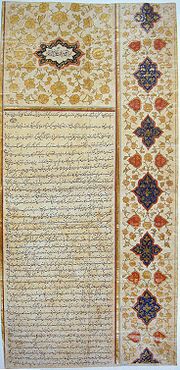
Georgia (country)
Georgia is a sovereign state in the Caucasus region of Eurasia. Located at the crossroads of Western Asia and Eastern Europe, it is bounded to the west by the Black Sea, to the north by Russia, to the southwest by Turkey, to the south by Armenia, and to the southeast by Azerbaijan. The capital of...
in 1801 following the death of George XII of Georgia
George XII of Georgia
George XII , sometimes known as George XIII , of the House of Bagrationi, was the last king of Georgia from 1798 until his death in 1800...
. General Tsitsianov
Pavel Tsitsianov
Pavel Dmitriyevich Tsitsianov was the Georgian Imperial Russian military commander and infantry general from 1804. A member of the noble Georgian family Tsitsishvili , Tsitsianov participated in suppression of the Kościuszko Uprising and in the Russo-Persian War...
occupied Georgia against rival Persian and Ottoman claims, and attacked Erevan in Persia in 1804, triggering a Russo-Persian War, and soon the Russo-Turkish War was also declared in 1806.
Britain, an ally of Russia, had been temporizing without a clear show of support. The Shah decided to respond to Napoleon's offers, sending a letter carried by ambassador Mirza Mohammed Reza-Qazvini (Mirza Riza) to the court of Napoleon, then in Tilsit in eastern Germany
Germany
Germany , officially the Federal Republic of Germany , is a federal parliamentary republic in Europe. The country consists of 16 states while the capital and largest city is Berlin. Germany covers an area of 357,021 km2 and has a largely temperate seasonal climate...
. In his instructions to the ambassador, the Shah explained that:
The Shah also clearly considered helping France in the invasion of India:
The Shah however denied the possibility of providing a port to the French "on they way to Hindustan
Hindustan
Hindustan or Indostan, literal translation "Land of River Sindhu ", is one of the popular names of South Asia. It can also mean "the land of the Hindus"...
".
Alliance and military mission
Following the visit of the Persian Envoy Mirza Mohammed Reza-Qazvini to Napoleon, the Treaty of Finckenstein formalized the alliance on 4 May 1807, in which France supported Persia's claim to GeorgiaGeorgia (country)
Georgia is a sovereign state in the Caucasus region of Eurasia. Located at the crossroads of Western Asia and Eastern Europe, it is bounded to the west by the Black Sea, to the north by Russia, to the southwest by Turkey, to the south by Armenia, and to the southeast by Azerbaijan. The capital of...
, promising to act so that Russia would surrender the territory. In exchange, Persia was to fight Great Britain
Great Britain
Great Britain or Britain is an island situated to the northwest of Continental Europe. It is the ninth largest island in the world, and the largest European island, as well as the largest of the British Isles...
, and to allow France to cross the Persian territory to reach India.
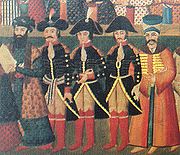
Claude Matthieu, Count Gardane
Charles-Matthieu, Comte de Gardane was a French general and diplomat. He entered the army and rose rapidly during the revolutionary wars, becoming captain in 1793....
in order to help modernize the Persian army, and in order to chart an invasion route to India. Gardanne also had the missions to coordinate Ottoman and Persian efforts against Russia. Gardanne's mission consisted in 70 commissioned and non-commissioned officers, and started to work at modernizing the Persian army along European lines. The mission arrived on 4 December 1807.
Captains of infantry Lamy and Verdier trained the Nezame Jadid (New Army), which served under Prince Abbas Mirza
Abbas Mirza
Prince, Field-Marshal Abbas Mirza born Amol city , was a Qajar crown prince of Persia. He developed a reputation as a military commander during wars with Russia and the Ottoman Empire, as an early modernizer of Persia's armed forces and institutions, and for his death before his father, Fath Ali...
. This modernized army successfully defeated a Russia Army attack on the strategic city of Erevan on 29 November 1808, showing the efficiency of French training. Lieutenants of artillery Charles-Nicolas Fabvier and Reboul were sent by Gardanne to Ispahan in order to set up a factory to produce cannon
Cannon
A cannon is any piece of artillery that uses gunpowder or other usually explosive-based propellents to launch a projectile. Cannon vary in caliber, range, mobility, rate of fire, angle of fire, and firepower; different forms of cannon combine and balance these attributes in varying degrees,...
s for the Persian artillery, complete with foundries, lathes, machinery and instruments. Against great odds, by December 1808, they had managed to produce 20 pieces of cannon in the European style, which were transported to Tehran.
The 19th century diplomat Sir Justin Sheil commented positively on the French contribution in modernizing the Persian army:

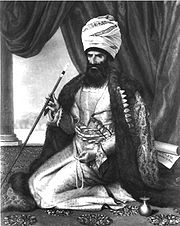
Battle of Friedland
The Battle of Friedland saw Napoleon I's French army decisively defeat Count von Bennigsen's Russian army about twenty-seven miles southeast of Königsberg...
in July 1807, and France and Russia became allied at the Treaty of Tilsit. General Gardanne arrived in Tehran
Tehran
Tehran , sometimes spelled Teheran, is the capital of Iran and Tehran Province. With an estimated population of 8,429,807; it is also Iran's largest urban area and city, one of the largest cities in Western Asia, and is the world's 19th largest city.In the 20th century, Tehran was subject to...
in Persia after the Treaty of Tilsit, in December 1807.
Napoleon however wished to continue fostering the Franco-Persian alliance, in order to pursue his plan of invading India. To this effect, he planned to nominate his brother Lucien Bonaparte
Lucien Bonaparte
Lucien Bonaparte, Prince Français, 1st Prince of Canino and Musignano , born Luciano Buonaparte, was the third surviving son of Carlo Buonaparte and his wife Letizia Ramolino....
as his representative in Tehran. Napoleon still planned to invade British India, this time with Russian help.
A Persian ambassador was sent to Paris, named Askar Khan Afshar
Askar Khan Afshar
Askar Khan Afshar was a Persian ambassador who was sent to Paris, during the period of the Franco-Persian alliance. He arrived in Paris on 20 July 1808 and was able to meet Napoleon on 4 September 1808 at Château de Saint-Cloud...
. He arrived in Paris on 20 July 1808 and was able to meet Napoleon on 4 September 1808.
Persia however lost the main motivation for the alliance, the recovery of Georgia
Georgia (country)
Georgia is a sovereign state in the Caucasus region of Eurasia. Located at the crossroads of Western Asia and Eastern Europe, it is bounded to the west by the Black Sea, to the north by Russia, to the southwest by Turkey, to the south by Armenia, and to the southeast by Azerbaijan. The capital of...
and Azerbaidjan over Russia, which had not even been addressed at the Treaty of Tilsit.
The Franco-Persian alliance thus lost its main motivation as France and Russia were now allied. The Shah of Persia again turned to the British for military advisers. In the east, a mutual defense treaty was signed between British India and Shah Shuja al-Mulk of Afghanistan
Afghanistan
Afghanistan , officially the Islamic Republic of Afghanistan, is a landlocked country located in the centre of Asia, forming South Asia, Central Asia and the Middle East. With a population of about 29 million, it has an area of , making it the 42nd most populous and 41st largest nation in the world...
on 17 June 1809 in order to better resist the Franco-Persian threat, but by that time Persia had already denounced its alliance with France.
Return of a British alliance
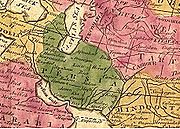
John Malcolm
Major-general Sir John Malcolm was a Scottish soldier, statesman, and historian-Early life:Born at Burnfoot, Dumfriesshire, Malcolm was the son of George Malcolm, a gentleman farmer of Eskdale and Burnfoot. Jock, as he was then known, was one of the four Malcolm brothers who attained knighthoods...
in 1808, who was only allowed to negotiate with the Governor of Fars, Sir Harford Jones managed to sign in March 1809 a preliminary treaty with Persia and General Gardanne was returned to France. In another mission in 1810, Malcom brought a large mission of officers, one of whom, Lindsay Bethune, would become Commander-in-Chief of the Persian army for several years. In 1809-1810, the Shah sent ambassador Haji Mirza Abul Hasan Khan to the Court in London
London
London is the capital city of :England and the :United Kingdom, the largest metropolitan area in the United Kingdom, and the largest urban zone in the European Union by most measures. Located on the River Thames, London has been a major settlement for two millennia, its history going back to its...
, immortalized as Hajji Baba
The Adventures of Hajji Baba
The Adventures of Hajji Baba is an American film, released on October 1, 1954 in the United States. The film was made in Southern California, and starred John Derek and Elaine Stewart.- Plot :...
by diplomat James Morier
James Justinian Morier
James Justinian Morier was a British diplomat and author noted for his novels about Qajar dynasty Iran, most famously for the Hajji Baba series.-Early life:...
. According to Sir Justin Sheil:
Epilogue
The alliance between France and the Ottoman Empire was maintained, and a peace settlement was brokered between Russia and the Ottomans, but the territories the Ottomans had been promised (MoldaviaMoldavia
Moldavia is a geographic and historical region and former principality in Eastern Europe, corresponding to the territory between the Eastern Carpathians and the Dniester river...
and Wallachia
Wallachia
Wallachia or Walachia is a historical and geographical region of Romania. It is situated north of the Danube and south of the Southern Carpathians...
) through the Treaty of Tilsit were never returned, although the Ottomans themselves had complied with their part of the agreement by moving their troops south of the Danube
Danube
The Danube is a river in the Central Europe and the Europe's second longest river after the Volga. It is classified as an international waterway....
.
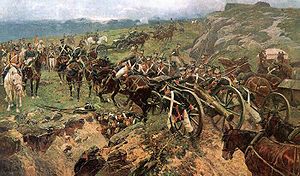
In 1812, through the Treaty of Bucharest, the Ottoman Empire and Russia also agreed to make peace, just as Russia was anxious to liberate this southern front in anticipation of Napoleon's Invasion of Russia
French invasion of Russia
The French invasion of Russia of 1812 was a turning point in the Napoleonic Wars. It reduced the French and allied invasion forces to a tiny fraction of their initial strength and triggered a major shift in European politics as it dramatically weakened French hegemony in Europe...
, with Russia keeping Bessarabia
Bessarabia
Bessarabia is a historical term for the geographic region in Eastern Europe bounded by the Dniester River on the east and the Prut River on the west....
and the Ottomans regaining Wallachia
Wallachia
Wallachia or Walachia is a historical and geographical region of Romania. It is situated north of the Danube and south of the Southern Carpathians...
and Moldavia
Moldavia
Moldavia is a geographic and historical region and former principality in Eastern Europe, corresponding to the territory between the Eastern Carpathians and the Dniester river...
.
After the fall of Napoleon, a French officer named Jean-François Allard
Jean-François Allard
Jean-François Allard was a French soldier and adventurer.Born in Saint Tropez, he became a soldier and was twice injured while serving in Napoleon's army. He was awarded the Légion d'honneur, and promoted to Captain of the 7th Hussars. After Waterloo, he drifted around and went to Persia where he...
visited Abbas Mirza to propose his services. He was promised the position of a Colonel, but never actually received the troops corresponding to his function. In 1820, Allard left for Punjab
Punjab region
The Punjab , also spelled Panjab |water]]s"), is a geographical region straddling the border between Pakistan and India which includes Punjab province in Pakistan and the states of the Punjab, Haryana, Himachal Pradesh, Chandigarh and some northern parts of the National Capital Territory of Delhi...
where he played a great role.
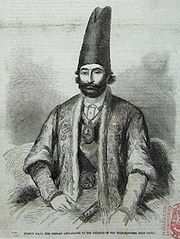
Afghanistan
Afghanistan , officially the Islamic Republic of Afghanistan, is a landlocked country located in the centre of Asia, forming South Asia, Central Asia and the Middle East. With a population of about 29 million, it has an area of , making it the 42nd most populous and 41st largest nation in the world...
city of Herat
Herat
Herāt is the capital of Herat province in Afghanistan. It is the third largest city of Afghanistan, with a population of about 397,456 as of 2006. It is situated in the valley of the Hari River, which flows from the mountains of central Afghanistan to the Karakum Desert in Turkmenistan...
. Great Britain would remove its military and diplomatic missions from Persia, and occupy Kharg island
Kharg Island
Kharg Island is a continental island in the Persian Gulf belonging to Iran. The island is located off the coast of Iran and northwest of the Strait of Hormuz. Administered by the adjacent coastal Bushehr Province, Kharg Island provides a sea port for the export of oil and extends Iranian...
and attack Bushehr
Bushehr
Bushehr Bushehr lies in a vast plain running along the coastal region on the Persian Gulf coast of southwestern Iran. It is the chief seaport of the country and the administrative centre of its province. Its location is about south of Tehran. The local climate is hot and humid.The city...
. Mohammad Shah Qajar
Mohammad Shah Qajar
Mohammad Shah Qajar was king of Persia from the Qajar dynasty .- Rise to power :...
would in turn resume diplomatic relations with France, and send a diplomatic mission to Louis-Philippe under Mirza Hossein Khan
Mirza Hossein Khan
Mirza Hossein Khan Ajudan Bashi was a 19th century Persian diplomat. He was sent to France in 1839 by the Persian ruler Mohammad Shah Qajar following the conflict between Persia and Great Britain over the possession of Herat in Afghanistan...
to obtain military help. In response, a group of French officers was sent to Persia with the returning ambassador.
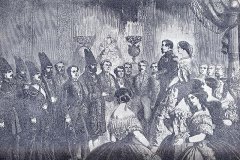
Anglo-Persian War
The Anglo-Persian War lasted between November 1, 1856 and April 4, 1857, and was fought between the United Kingdom of Great Britain and Ireland and Persia . In the war, the British opposed an attempt by Persia to reacquire the city of Herat...
(1856–1857), a Persian ambassador named Ferouk Khan
Ferouk Khan
Farrokh Khan Amin-Doleh, Ferouk Khan, also Feruk Khan or Ferukh Khan , was Vice Premier to the court of Mozaffar ad-Din Shah Qajar and the Persian ambassador to the Emperor of the France, Napoleon III and Queen Victoria...
was sent to Napoleon III, who expressed his regrets about the conflict. Negotiations led to the March 1857 Treaty of Paris
Treaty of Paris (1857)
The Treaty of Paris marked the end of the hostilities of the Anglo-Persian War. On the Persian side negotiations were handled by ambassador Ferukh Khan...
, which put an end to the Anglo-Persian War.
See also
- Foreign alliances of FranceForeign alliances of FranceThe foreign alliances of France have a long and complex history spanning more than a millennium. One traditional characteristic of the French diplomacy of alliances has been the "Alliance de revers" The foreign alliances of France have a long and complex history spanning more than a millennium. One...
- France-Asia relations
- France-Iran relations
- Treaty of Finckenstein
- Franco-Ottoman allianceFranco-Ottoman allianceThe Franco-Ottoman alliance, also Franco-Turkish alliance, was an alliance established in 1536 between the king of France Francis I and the Turkish ruler of the Ottoman Empire Suleiman the Magnificent. The alliance has been called "the first non-ideological diplomatic alliance of its kind between a...

